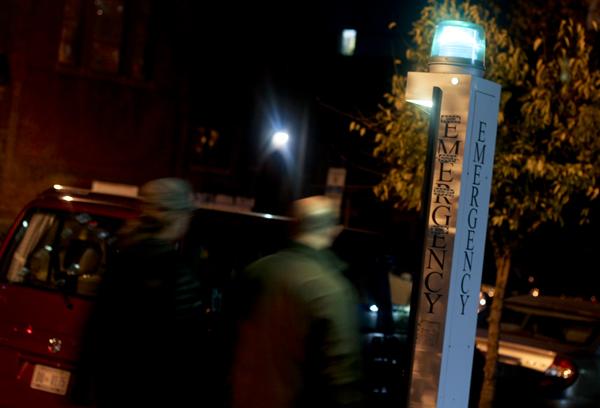Students in distress will be able to dispatch GW police to their exact location on campus using a new smartphone app as soon as next fall.
The emergency app will connect students directly to the University Police Department as older methods such as the blue light system decline in use. GW will join several schools nationwide that have invested in apps for students over the past few years.
While students can currently call UPD on their cell phones or use blue light phones, Senior Associate Vice President for Safety and Security Darrell Darnell said taking advantage of new technology would make campus even safer.
“When you walk around campus, [your phone] is always with you. We want that tool wherever you go to have the ability to directly contact GWPD,” Darnell said.
University Police Chief Kevin Hay said many students don’t know how to contact UPD or may not have the emergency phone number included in their lists of contacts.
“With this app, it becomes much easier to contact us,” Hay said.
The app would let students upload identifying information or stay anonymous like a typical 911 call. It would also let students send audio and video recordings of campus crime, Darnell said.
Despite the availability of commercial security apps, Darnell said the University is making a specialized app that will be GW-specific. The department has been working on rolling out the app for a year, he added.
Six colleges on the East Coast, including Virginia Commonwealth University and Winthrop University, use LiveSafe, a commercial campus security app developed by Kristina Anderson, a victim of the 2007 Virginia Tech shooting that killed 32 students and injured 17 others.
VCU Chief of Police John Venuti said the app, which the university has used since the fall, has made it easier for the force to monitor crime in all corners of the urban campus in downtown Richmond, Va.
“We are a large urban campus, and my officers cannot be everywhere at once. With this application, we can get eyes everywhere,” Venuti said.
Though the school has a traditional light system, Venuti said the app complements the school’s safety efforts.
“My philosophy is that I don’t care how the students are talking to the police department, so long as they are talking to us. This application creates another channel for students to talk to us, and they have been very willing to use it so far,” Venuti said.
At GW, blue light calls have declined about 26 percent since 2010, and Hay has said most calls are late-night pranks.
National campus security advocate S. Daniel Carter said emergency apps help open communication between students and campus security.
“Many times there are barriers to this information. Using an app can remove some of these barriers by providing an additional line of communication, even if it is for trivial things,” Carter said. “As technology has evolved, security systems have evolved to keep up.”
Zaid Shoorbajee contributed reporting.








